
Aug 8, 2022 | Hiring Resources, IT
When it comes to writing an IT job description, it’s important to follow a few ground rules.
Not only should each employee have a clear job description as part of the HR process, crafting the perfect job description can actually help you to secure the best talent. But it’s not just that! A poor job description, or none at all could actually be preventing you from hiring the best IT talent.
Here’s our top tips to make your next IT job description the best yet.
Job title – stay away from buzzwords
Ensure that you keep your job title simple by using keywords that accurately describe the role. Keep away from using complicated jargon. For example, stick to using standard experience levels such as ‘senior’ rather that ‘VI’. Whilst it’s important to stand out when recruiting, keep the job description as factual as possible to avoid room for confusion.
To begin with, focus on the job title. A job title is the start of the process and will be used to advertise your role. Consider the level of expertise you want for the job, not just the role itself. If you are looking for a 2nd Line Support engineer, but the experience you need is more Systems Analyst, you’ll need to remember that the job title may put some people off. It’s the age of LinkedIn and people are proud of their achievements and their career. Do bare this in mind when writing your job description.
Job summary – the start of an IT job description
Standing out in a crowded market can be hard. The demand for talent for IT jobs is rising each month. Begin by capturing a candidate’s attention with a short and engaging summary. This should include the expectations of the role and a brief overview of your company. Why are you unique and why is working for you such a fantastic opportunity? Think of the job description as another step in the journey. Remember that it’s usually what a candidate sees before they come for an interview. Don’t lose their interest at this stage. Remember to still sell the opportunity!
Here’s a top tip to help you stand out –
In the current market more and more that candidates are looking to give something back and this could be your chance to shine. Ask yourself ‘How does this role contribute to making people’s lives better, or solve existing problems?’ then fill in the blank – ‘come and join a team dedicated to…..’ You may be surprised how effective this can be.

Include clear responsibilities and duties for your job
Less is most definitely more! Whilst you want to clearly define the main responsibilities of the position, make them detailed yet concise. If there is a lot of responsibilities with the role, why not group them into categories? This will make them much easier to read and absorb.
It’s also important to think long-term too. We advise thinking about how this position will contribute to the goals and business objectives of the company. Is there the potential for advancement for candidates? By presenting the whole opportunity, you will attract the best candidates.
Refresh often
When you look to hire, do you go to HR and dust off that old job description again? Has the experience needed changed? Is the culture different now? It’s important to make sure that you review and even re-write your job descriptions regularly. Make sure that it is still fit for purpose!
One of the things that has changed for most companies is flexibility with working from home. In fact, there was an article in The Times yesterday (15.08) that showed how software engineers in particular we in control of working arrangements due to the candidate shortage. If you have a work from home policy, it’s important to include reference to this in the job description.
TOP TIP: – get your employees involved when writing your job description! No one knows the job better than those that already do it.
Things to avoid when writing your IT job description
- Discrimination – Be aware of unconscious bias’s
- Asking too much – Unrealistic expectations could prevent star candidates from applying
- Negativity – Be sure to write the description in a positive tone
- Forgetting about structure – Make the job description easy to read. Bullet points are always a good idea!
- Being mysterious – Be intriguing without holding back crucial information
- Mistakes – Check and check again for mistakes. Candidates will be quick to judge if there are spelling mistakes!
Following these 5 steps to writing a fabulous job description could help you secure your ideal IT candidate.
If you are looking for experienced IT experts for your business, whether permanent or contract get in touch with the team at Langley James today!

Aug 5, 2022 | IT, IT Market Reviews
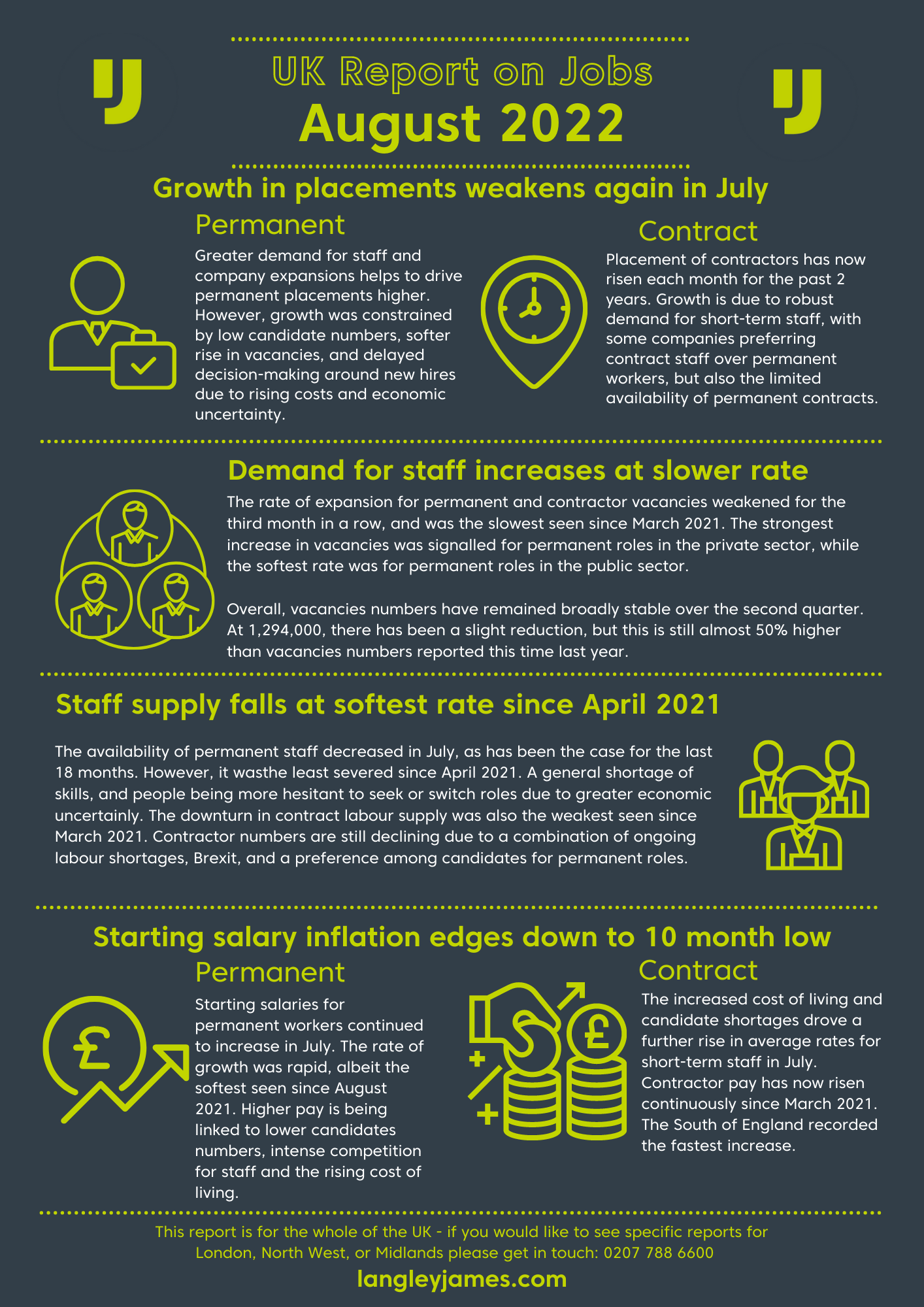

Jul 20, 2022 | Hiring Resources, IT, Tips
When it comes to attracting candidates, the benefits of offering hybrid working are something you should still consider. As yourself, is it necessary to have your team on site for 5 days? We appreciate that some roles in IT are hard to perform remotely. However, it still seems that most candidates are looking for flexibility and some form of hybrid working.
We’ve all been experienced the benefits of working from home. Saving money and time on commuting, having a better work / life balance. There are many great things about being able to work flexibly. But what about the benefits to you, the employer? What have you got to gain from offering hybrid working? Our expert recruiters share their insight.
Larger pool of candidates
We are living in a time where there is a real shortage of skilled candidates. With vacancies over 1m in the UK and unemployment figures low, it’s getting harder to find the best IT talent. However, if you can offer remote working, your candidate pool suddenly becomes the whole of the UK, or even the World! Think of the diversity this could bring to your team. And the greater availability of exceptional candidates for your IT vacancy.
Improved loyalty is one of the benefits of offering hybrid working
According to various reports, we are in the middle of The Great Resignation. Around the world, workers are quitting their jobs in record numbers – and bosses are still scrambling to figure out how to keep them. However, offering hybrid working can help combat this. Lots of people were working from home during lockdown and let’s be honest, we all got rather used to it. Companies adapted and in most cases, business continued as normal.

But now that we are back in the office, the promise of flexible working is slowly disappearing. But candidates are looking for flexibility. Therefore, if you are genuinely able to offer hybrid, flexible or remote working, you should have a larger pool of candidates to choose from. Plus, if you continue with flexible working, employees are likely to stay with you for longer. Why would they move for another job if it meant going back to an offer 5 days a week?
It focuses on mental wellbeing
Mental wellbeing has been big news recently. There’s a renewed focus on the mental health of our teams. And companies who have a wellbeing policy are more likely to attract more candidates. By offering flexibility in working patterns, or work locations, you will be seen as a company who looks after their employees. It also shows that you have trust in your teams, and this can go a long way.
Are you recruiting?
If you are currently recruiting in IT, you’ve no doubt noticed the huge reduction in applications. That’s where we can come in. We’ve been recruiting IT candidates for over 20 years and have a large database of highly skilled IT candidates. Even in the skills shortage, we are still able to secure exceptional levels of IT talent for our clients. We’d love the opportunity to do the same for you. Get in touch with our team today and see how we can help you to recruit someone worth recruiting.

Jul 10, 2022 | IT, IT Market Reviews
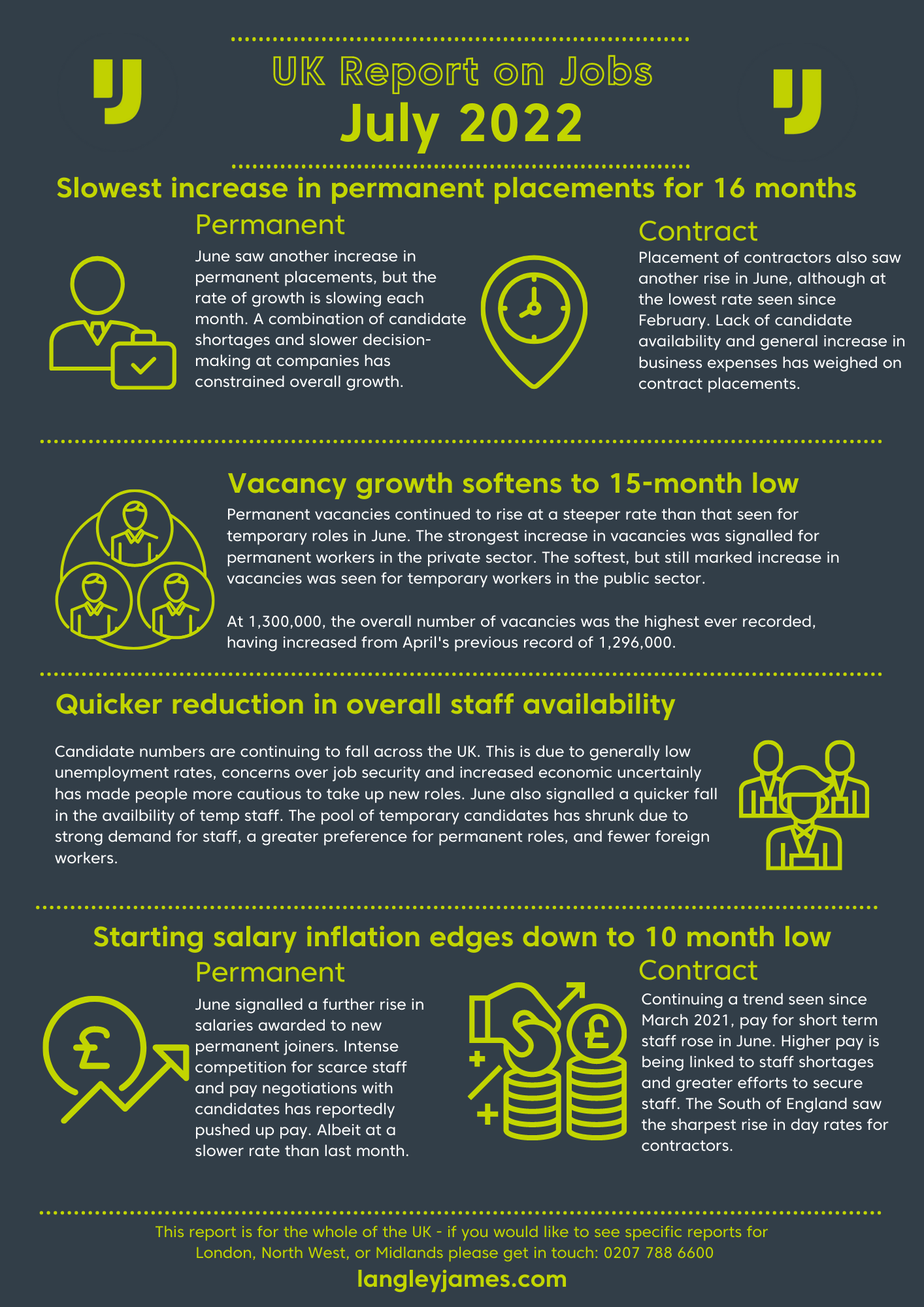

Jul 9, 2022 | Hiring Resources, IT
IT salaries seem like they are on an ever-increasing trajectory. With the demand for staff higher than ever before, and the candidate pool shrinking by the day, it’s no surprise. But what does this actually mean for salaries?
We regularly review the average salaries for the most popular jobs in IT. And we always give an indication if it’s up or down from the previous month. But it’s when you look over a longer period that you really get to see the bigger picture. Some will have you believe that salaries have increased dramatically across the board. This is not the case. Yes, it’s true that some salaries have seen as much as 96% increases. However, there are some areas of IT where salaries have remained broadly the same.
So, we’ve taken a look through the archives to give you a bigger picture view of IT salaries over the last 2 years.
Senior IT leadership roles that saw the biggest increase in IT salaries
There’s no doubt that it’s at the top end of the scale where we’ve seen tha largest jumps in average pay. In September 2020, the average salary for a CTO was £100k. And in our most recent salary survey (July 22), that’s increased to £144k. An easy % increase to work out there! And it’s a similar story for an IT Director. £112k in September 2020 to £150k in July 2022. A 34% increase. And a Head of IT too. £77k in 2020, £90k today. So, if you are looking to hire into your senior IT leadership team, it’s safe to say you’ll have to offer a lot more to attract the best than you did 2 years ago.
Trends that have helped increase average salaries in IT
The world of business has experienced many changes over the last 2 years. The pandemic meant that some business really had to fast track future plans. And this is reflected in the average IT salaries for those jobs most in demand to operate in this new normal. The step change growth in e-commerce when we were all confined to our homes has had a dramatic impact on salaries in this specialism. In September 2020, the average salary for an e-commerce manager was £65k. You’d now have to pay around £84k to secure the same talent.
But it’s not just e-commerce. Business are relying more heavily on data than ever before. Data driven insights have become an essential part of business success. And this is where we reveal the IT role that has seen the largest increase in average salary. A database manager would earn an average salary of just £50k in September 2020. This is now a much larger sum of £96k. That’s a 92% increase!

IT salaries that have remained more static
Whilst all areas of IT have experienced some increase in average salaries. Some have seen little change. However, before we share this information with you, it’s important to consider that these are the average salaries on offer. An overview of the jobs market and demand for candidates. The skills shortage does mean that starting salaries are often higher than that advertised. Take a look at our most recent report on jobs to see the trends.
When researching the change in salaries, we noticed that it’s the less senior roles that haven’t seen too much change. For example, a 1st Line Support role was £28k in 2020. And that figure remains the same today. And it’s a similar story with 2nd line. £35k in 2020 and £26k today. It’s 3rd line that has seen the largest increase in the support specialism. An increase of 9% from £36k in 2020 to £51k in 2022.
Want to know more?
We’ve been recruiting IT candidates since 1999. And we’ve seen a lot of agencies come and go during this time. It’s not enough for an IT recruitment agency to simply advertise your job and share the best applications with you. You could do that yourself! Admittedly, there would be a cost to advertise the roles that could end up costing a lot more than a recruitment fee, but the choice is still there.
At Langley James, we are experts at what we do. Our pure passion for all things IT is seen throughout our exceptional service levels. We work on all our clients’ vacancies as if they were our own. And this is where our market research comes in. We know the market. We know the trends, the average salaries and more. And we make sure that we share this with all our clients to enable them to recruit someone worth recruiting.
Get in touch with our team today to see how we can help with your IT vacancies.

Jun 13, 2022 | IT, IT Market Reviews
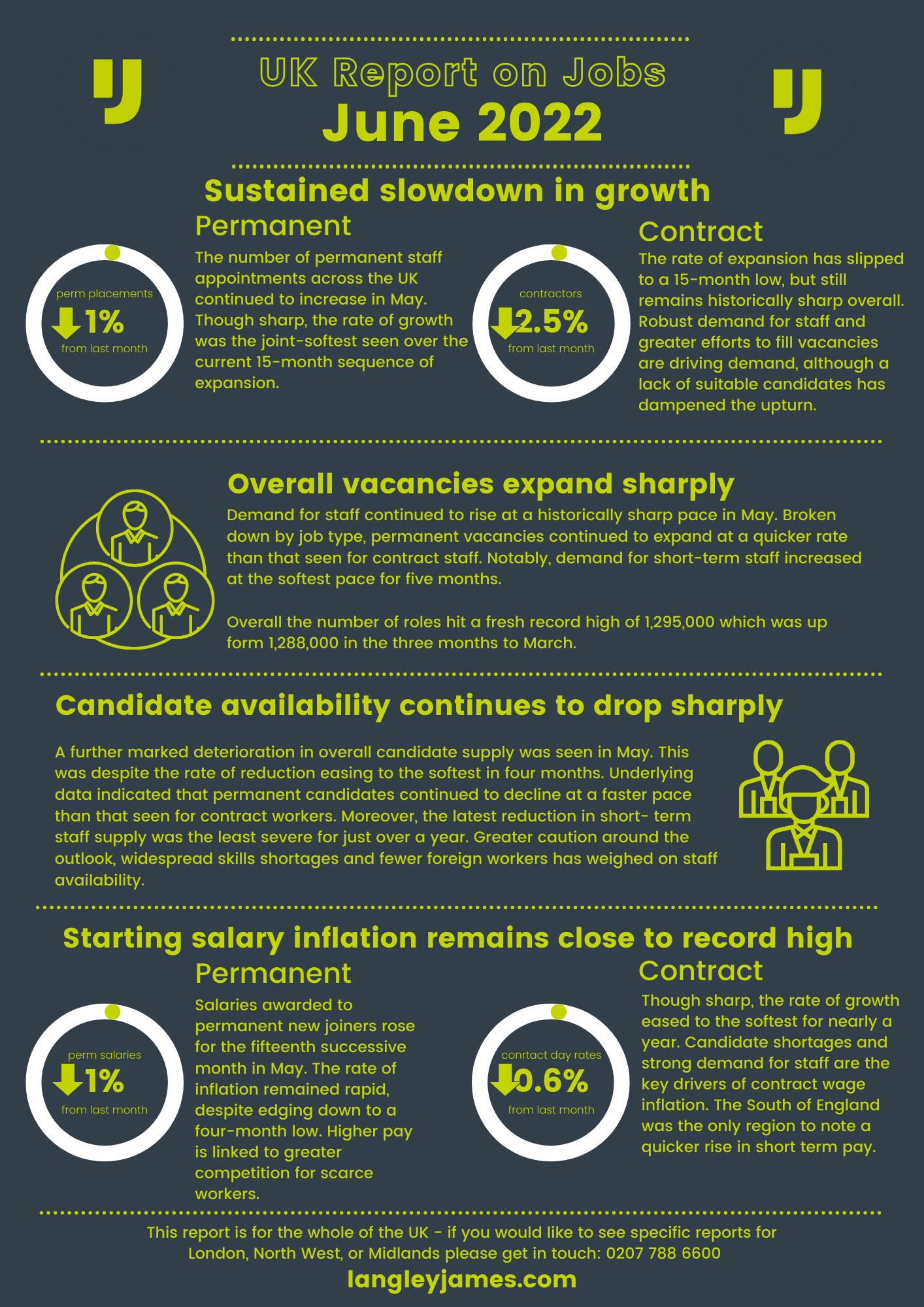

Jun 10, 2022 | IT, Tips
The Great Resignation is well and truly here! According to a recent survey conducted by PwC, 18% of workers cited that they are “very or extremely likely” to change jobs within the year. Plus a further 32% saying they were “moderately or slightly” like to move on. So, what’s causing this great revolt? It’s not just driven by pay, despite this being one big reason due to the cost-of-living crisis. In fact, the PwC study also found that 72% of UK workers are planning to ask for a pay rise in the next 12 months. But another important factor is job satisfaction that now scores high on an IT candidates wish list.
So, let’s look at what you can do to survive the great resignation in your company –
Review your salaries
There’s no getting away from the fact that it’s costing more to get to work than ever before. The cost-of-living is increasing at an alarming rate and people are looking for ways to cope. By reviewing your salaries across the board, you may be able to secure more staff. Get your teams together and ask about their concerns about the cost-of-living crisis. Taking a proactive approach in this situation may create more loyalty from your team. Also – acting early may mean that you actually save money. The increases we are experiencing are not likely to go away for a while. In fact, it’s more likely that they will continue to increase. It’s possible that your team will expect a more significant pay rise the later in the year you deal with it. It’s certainly something to consider.
If you are looking for guidance on salaries, we can help. Each month we produce an IT Salary Guide that shows you the latest average salaries for the most popular jobs in IT.
Look at your company culture
Was your company culture affected during lockdown? What steps did you take to ensure that the culture was still attractive to your teams? There have been some significant changes to the way we work together. By speaking to your teams and listening to what they have to say about the culture, you could save yourself having to replace as many people. What does your team want? Don’t assume! There’s no getting away from the fact that creating a culture in the world of hybrid working isn’t an easy task. But getting it right can make all the difference.

Flexibility can help you through the great resignation
Right now, around two-thirds of people are working remotely. This is either on a full-time or part-time basis. But it’s important to remember that offering remote working isn’t essential to a happy IT team. Flexibility is the key. Everyone will have different needs and it’s important to meet these where you can. It may be that you are more flexible with the working hours. This is particularly helpful to staff with children. Allowing later starts, or even giving time off for the school pickup, for additional hours to be completed from home. These things can make a big different to retaining your team. Think about what can work for you.
Are you offering the right rewards?
It’s more than just a strong basic salary that will secure your team. What else are you able to offer? This may be bonus payments of completion of projects. A bonus for achieving KPI’s on a helpdesk. Whatever your business will benefit from, attaching a reward is likely to not only increase productivity but also engagement too. We appreciate that not every company has a bottomless pot to keep paying out to keep their team. But some rewards don’t have to cost you more. You could offer additional holidays, memberships to platforms like PerkBox, or even a monthly social event. Again, the best way to find out what will be best received is by talking to your teams.
Learning and development
This is something our IT consultants are hearing a lot at the moment. Great candidates are considering leaving their current employer due to lack of skill building. Most candidates in IT are passionate about learning new skills. What can you do to help facilitate that? Are there courses that your teams can attend that will benefit your company? Or maybe some on the job training will help? It’s not only a great way to keep your staff engaged, it’s the ideal way to up-skill your team. This could develop into clear career progression plans. Another area that candidates are particularly interested in right now.
Start pooling candidates – no one will be unaffected by the great resignation
Despite your best efforts, it’s unlikely that you will survive without losing any of your team. But this doesn’t have to be a bad thing. It can be your opportunity to really think about the skills you want. What personality fits best with your team and company culture? But to prevent too much disruption, it’s important to be prepared. Recruiting the right candidate is taking longer than normal. Finding good candidates can be tough, but that’s not all. Counteroffers are happening more and companies are competing for the same candidates. By working with a specialist IT recruitment agency, you will be able to not only interview candidates quickly, but you’ll also know about their other opportunities and gain insights on how to secure them for your company. Get in touch with our team to see how we can help.

May 28, 2022 | IT, Tips
Exit interviews will be more commonplace. With one in five employees expected to change jobs this year, you may have already lost some of your team. Did you hold an exit interview? If you didn’t then you could be missing out. It’s your opportunity to find out things that need to be actioned to help improve your retention rates. No matter the size of your company, it’s likely you don’t really know how your employees are feeling. So, utilising the exit interview for an insiders view is invaluable.
But how do you make sure that you get the best out of your time? You need to carefully consider what you’d like to find out. And more importantly, what you’ll do with it.
First, let’s cover some exit interview do’s and don’ts
Exit Interview Do’s
It’s always best practice to get a member of the HR team to conduct the interview. Your employees may be more honest with HR than with a line manager or director. Your employees will need to feel comfortable that their honesty will be appreciated. It’s important that they don’t feel judged. Reassurance is also key when it comes to confidentiality. An employer is likely to share more if they know it’s not going to be widely shared.
Exit Interview Don’ts
You know the well-known phrase about making assumptions. It’s important not to assume anything. Keep an open mind and don’t allow bias, or even disappointment to creep in. Don’t email a list of questions and expect an honest response. Exit interviews should always be conducted face to face if you are to really benefit. And finally, don’t forget to say thank you. Thanks the employee for their time and their honesty. Remember, they are likely to share some of their experience with their colleagues.

Questions to ask
It’s key that you approach each exit interview individually. Having a set list of questions that you use for every employee isn’t going to give you the answer you need. However, here’s 10 examples to get you started –
- What was it that made you start to look for another role?
- Was it the salary or the culture that attracted you to this new role?
- Do you feel that you were supported in your role?
- Did you feel that you could cope with your workload? – Burnout is on the rise. This is a key question to determine if it’s a problem in your workforce
- Have you been given extra training?
- Did you receive regular feedback from your line manager? – If so, it’s good to ask if it was predominately positive or negative
- Do you feel that you have all the tools you needed to do the role?
- Is the company culture what we promote it to be?
- Do you feel that your contribution was recognised?
- What would be one thing you could change about your role?
Looking to recruit?
If you are performing an exit interview, it’s likely there’s also the need to hire. The jobs market isn’t what it used to be. With more vacancies than ever before, it’s getting harder to find the right candidates. That’s where using an agency comes in. In times like this, it’s important that you are still able to secure the best people for your role. Working with an agency can make it all a lot easier. When you choose to work with Langley James, you get to benefit from our decades of experience and network building. This is where your next hire can be found.
So, if you are looking to recruit into your IT team, get in touch with our IT recruitment experts today and let’s help you to recruit someone worth recruiting.

May 12, 2022 | IT, IT Market Reviews
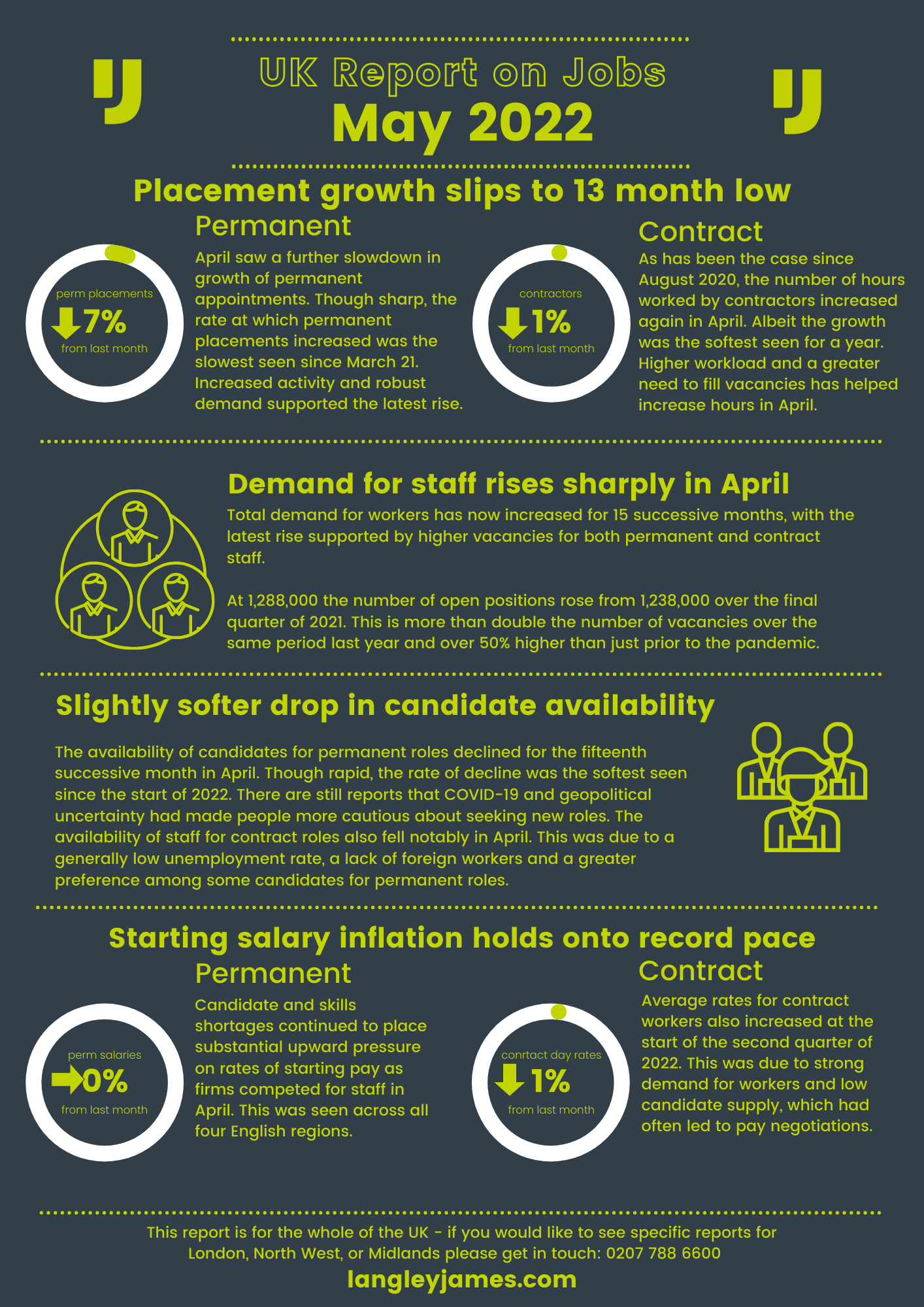

Apr 26, 2022 | Hiring Resources, IT, Tips
Onboarding IT staff correctly is one of the foundation building blocks in ensuring success when it comes to hiring. Often an area that is daily overlooked, it’s time that things changed! With the IT staff shortage reaching all areas of IT, businesses are starting to invest more in recruitment and retention. So don’t let your hiring process fall at the final hurdle. Our team share their top tips for onboarding IT staff in 2022.
But first, let’s share 2 key stats so that you can see why this is so important.
Here’s our Top 3 Tips for Onboarding IT Staff
Don’t wait until day 1
We’ve all been there. Working your notice period can be a lonely place to be. Plus, with the market being flooded with jobs as it is at the moment, it’s a vulnerable time for all. If you’ve secured a strong candidate, don’t then lose them for the sake of a few emails or calls. Keeping in touch with your new starter during their notice period is vital. Why not use this time to start to introduce them to their team? An email to make an introduction is enough, but you can take it further too. Arranging a virtual lunch with their teammates over Zoom or Team is a great way to make them feel involved before joining. Failing that, reach out to them on LinkedIn and ask their colleagues to do the same.
At Langley James, we pride ourselves on our exceptional levels of customer service. To both our clients and our candidates. That’s why, if you recruit with us, we will be in touch with your new hire each week during their notice period. This helps to alleviate any fears, answer any questions and to generally support them through their notice.
The art of storytelling when onboarding IT staff
It’s another hot topic in the employment market – employees like to join companies with shared values. And whilst their values will have felt aligned during the interview process, it’s important to share the story again when onboarding IT staff. You want your new hire to be professionally invested in your company. You want them to feel a sense of belonging and a sense of achievement. What purpose do you have as a company? Keep this at the forefront when designing your onboarding process. What exciting projects have you already been involved in, or, what do you have in the pipeline. Engaging your new hires with captivating stories about your company will make their first week an exciting one.

Set them up for success
Thinking that spending 10 minutes with your new hire on forms and formalities is enough is a mistake. It always takes time for a new hire to settle in. However, this has, in some cases, been further exacerbated by hybrid working. it can take longer for them to get into the team culture, establish a routine and understand new processes. Your role is to make their first few weeks as easy as possible. With lots of people spending so much time alone over the last couple of years, some may not have the confidence they used to. Make sure that they know where to turn if they have a problem. Let them know about lunch arrangements and even arrange for them to have a lunch buddy for the first week. Whilst this may not be necessary for more senior hires, it will certainly make a difference for more junior and mid-level roles.
About Langley James
We live and breathe everything IT. We know that market and know what it takes to attract the very best IT talent. Why not work with us on your next IT vacancy and experience the difference of working with a specialist who really does know the market. Get in touch with our expert recruiters today and let’s help you to recruit someone worth recruiting.

Apr 13, 2022 | IT, IT Market Reviews
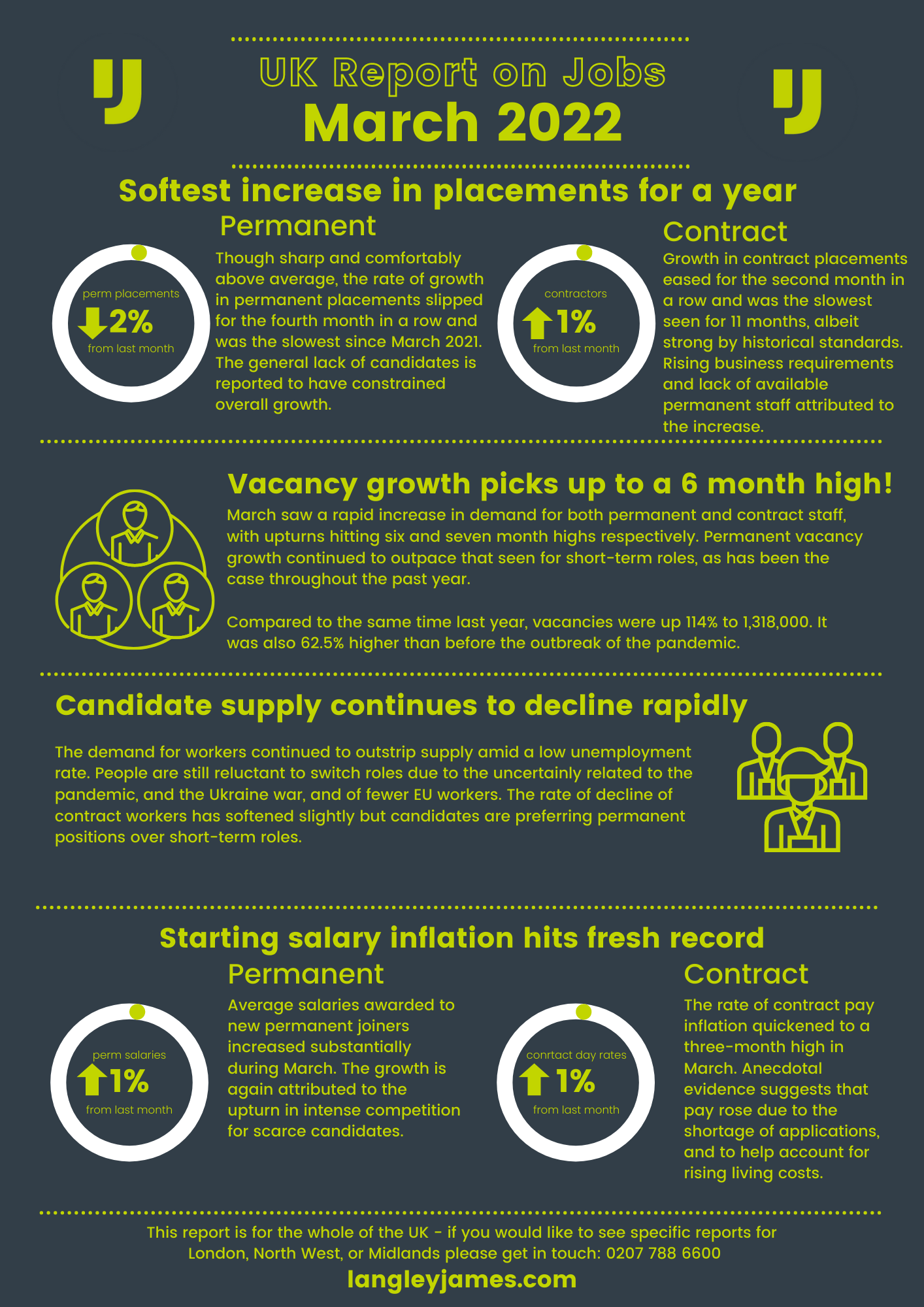

Mar 10, 2022 | IT, IT Market Reviews
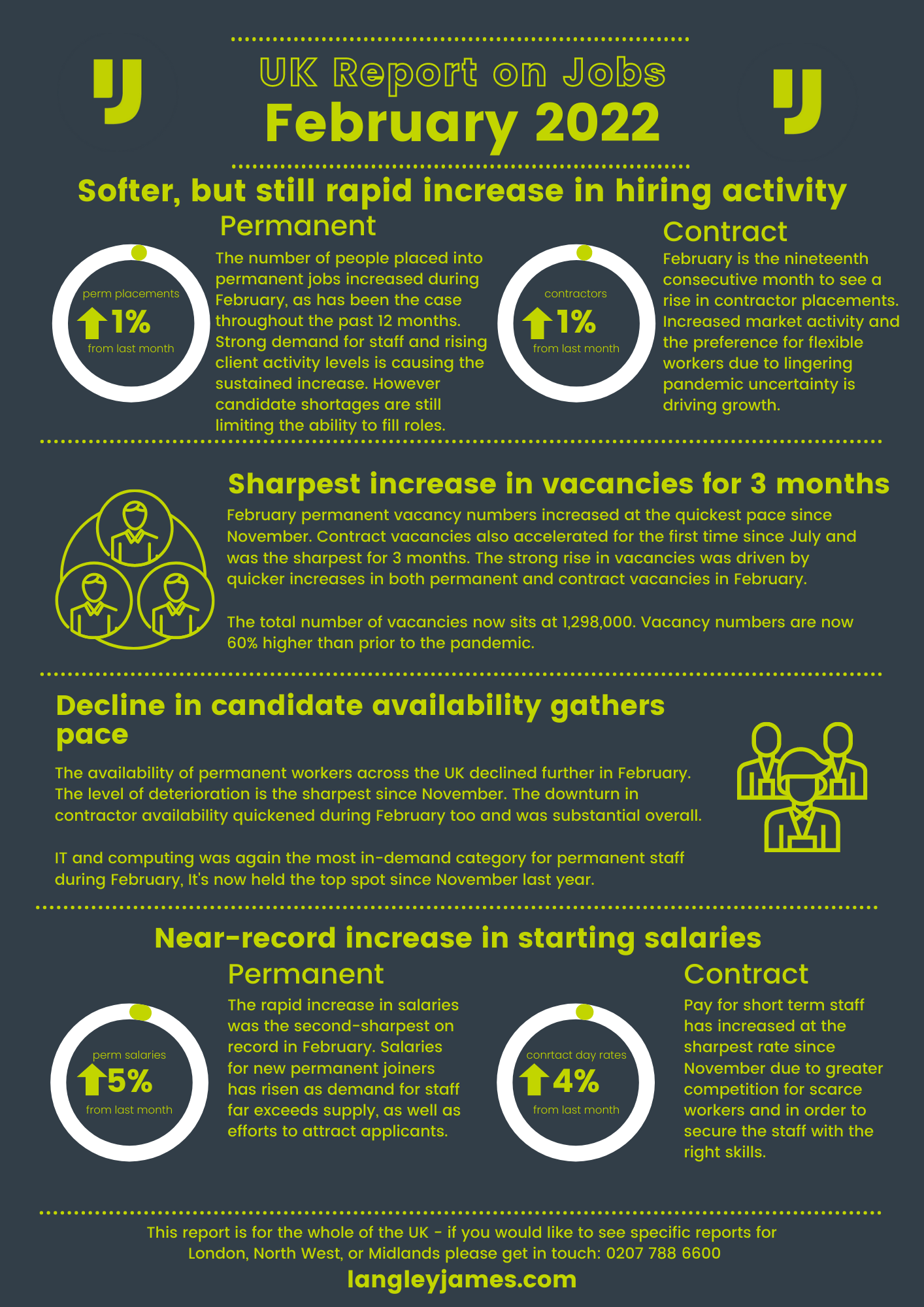

























Recent Comments